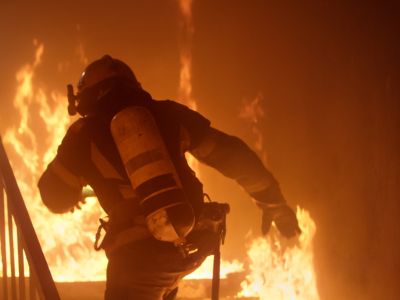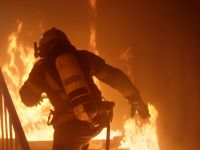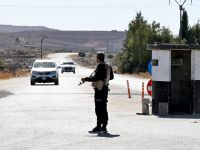A truck exploded near a Jewish shrine in the southern Tunisian island of Djerba on Thursday, killing at least six people and wounding 20, witnesses told Reuters.
According to reports, the truck, filled with natural gas, crashed into the wall surrounding the synagogue.
Helicopters were mobilized to bring the injured to the island's regional hospital. They suffered from burns of varying degrees of seriousness.
The official TAP news agency reported the blast took place near the historic Ghriba synagogue killed the driver of the truck, four German tourists and a police officer.
A government source said the blast was an accident but witnesses suspected it could be an attack on a symbol of the Jewish community in the North African country amid Arab anger at the Israeli offensive against Palestinians in the West Bank.
French radio reported that the Ghirba synagogue was one of the oldest in Africa. The synagogue has been a popular Jewish tourist attraction.
Tunisia's security services and judicial authorities have started an investigation into the causes of the blast.
Israel's Deputy Foreign Minister Micahel Melchior said that the explosion in Jerba was a deliberate anti-Jewish attack.
The Israeli Foreign Ministry believed that it was a "terror" attack.
"Our estimation, which is not based on hard evidence, but which is not baseless, is that it was a terror attack aimed at the synagogue," a senior Foreign Ministry source told Haaretz. "It is not located on a main road, it is an isolated place, and to get there you have to want to get there. There is a special road leading up to the synagogue."
Speaking on an Arab sattelite station, a Tunisian ofiicial pointed out the accident happened when a police officer tried to stop the truck that was speeding. The truck driver could not break in time and swerved off the road before eventually hitting the outside wall in the vicinity of the synagogue.
Quoted by Tunisian news agency TAP, Perez Trabelsi, president of the Ghriba association, said what happened is "an ordinary accident having nothing to do with developments in the Middle East. It has affected foreigners as well as Tunisian nationals working in the Ghriba.
I would like to pay tribute to the continued attention and care given to the Jewish community and to the peaceful coexistence between that community and the rest of Tunisian citizens, without any discrimination. This coexistence has deep historical roots going back to about 2600 years."
"Members of the Jewish community, children and adults, exercise their social activities and daily lives, be they at schools or other walks of life, ordinarily and within a context of safety and dignity".
Trabelsi added, "The Ghriba is a place of worship that is sacred. It is visited each year by 8,000 people from all around the world, to practice their religious rites and seek peacefully and quitely, to be blessed in this synagogue. It will go on normally next season".
Djerba is situated in the south-east of Tunisia on the Gulf of Qabes. Its capital Houmt Souk is located 108km east of Gabes and 513 km south of Tunis.
Djerba offers a variety of sea sports, Roman sites and a pirates castle. Djerba has a large Jewish population and contains some of the oldest Jewish religious sites in Africa, making it a popular destination for Jewish pilgrims from Europe.
An annual spring pilgrimage draws thousands of Jews to Ghriba each year from abroad.
Tunisia's Jewish community has dwindled in recent years to some 3,000 people. Jews have had rights equal to the Muslim majority in this North African country from the time it was a French protectorate. Authorities of the independent state established in 1956 promised to uphold these rights. (Albawaba.com)
© 2002 Al Bawaba (www.albawaba.com)









